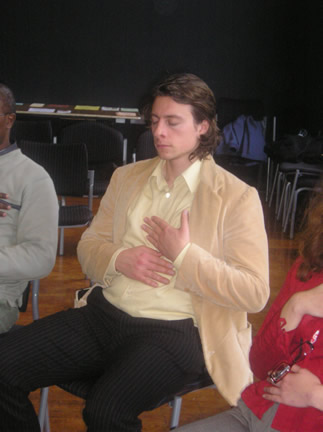 One
Reality:
the web-site of
Keith Beasley
One
Reality:
the web-site of
Keith Beasley
Relaxation for Researchers
As part of Bangor University's post-graduate conference in 2010 and 2011 (see HE Conferences) I co-ordinated a series of workshops aimed at helping students and researchers to relax and access a reflective state of mind. The success of these sessions was such that all participants were quite content, at its conclusion, to continue sitting peacefully, in silence.

The following was provided as a workshop handout.
Relaxation and inspiration for
researchers: Reiki Healing
Keith Beasley, Reiki Master
... healing is a coming
to terms with things as they are, rather than struggling to force them to be as
they once were, or as we would like them to be
Kabat-Zinn 2005, p336
The life of a
post-graduate can be challenging and of a researcher stressful. Whilst some
degree of pressure can, for some, be a motivation, to be effective in our work
requires us, somehow, to be both original & creative and, at the same time
it seems, conforming to a strict, objective, discipline. To many, neither
extreme seems to come naturally. It is my experience that Reiki Healing
provides one possible approach to being both relaxed and inspired in the course
of our research.
Reiki Healing, or more
correctly, the Usui System of Reiki Healing, whilst often promoted as another
'alternative therapy' has, by virtue of its Buddhist origins and profound
underlying essence, the potential to change our lives; to provide a tool for
overcoming our limiting and limited beliefs and thought patterns. Like a few
other, similar, processes (such as mindfulness) it provides us with a practical
method of 'rising above' those mental activities that can prevent the clear
mindedness we need for effective study.
Likewise, it was Einstein
who said “imagination is more important than knowledge”. Whilst beyond the
scope of this short paper, it is perhaps wise for a good researcher to ask him
or herself as to the nature of imagination and where it comes from. Many who
practice Reiki Healing would argue that, by enabling a deeper/higher level of
consciousness, this self-healing method has the potential to stimulate or
enable (depending on our perception of how it originates) our imagination.
Without imagination our research is likely to be flat, dull and uninspired.
Research also involves
becoming aware of the depth and intricate interconnections that surround our
chosen subject area. Whatever topic we may be studying, the more we probe and
investigate, the more subtle the arguments we unearth and broader we need to
spread our net of understanding to fully appreciate the underlying issues and
implications of the facts and theories that will form our thesis. To be able to
see and write in a way that embraces these features requires that we accept the
apparent contradictions that often emerge in research. It also means accepting
that our original, perhaps simplistic, ideas, are inadequate. To be good
researchers requires us to open our minds to a range of ideas and to be able to
integrate them into a consistent picture. This acceptance, is an excellent
example of the 'coming to terms with' of my opening quote. And Reiki Healing
is, I have found, a powerful way of enabling such 'coming to terms'.
In Higher Education as in
all forms of teaching and learning it is increasingly accepted that besides the
rational conceptualisation and understanding of a subject we need to have a
'feel' for it. Biggs, for example, talks about ‘functioning knowledge’:
It is a matter of addressing and integrating several
domains of knowledge. And we should be ensuring that our … knowledge
is alive and functioning. i.e. that it is embedded, has depth and practical
truth to it.
Biggs 2003, p43
Likewise, to learn a
subject we need to not just absorb facts and theories but to, somehow, have
experienced the knowledge that is being acquired. Heron, a pioneer of
humanistic and transpersonal psychology says this:
By 'intuiting' I refer
to the immediate, comprehensive knowing whereby the mind can grasp a field, a
system or a being as part of a patterned unity ... and know what it signifies,
what it means
Heron 1992, p17
Such knowing, if it
doesn't come during a direct experience, often comes on later reflection. Such
period of time spent quietly assimilation our latest intake of information and
experiences can be enhanced by use of techniques such as Reiki which help to
calm the rational mind and assists us to 'tune into' this 'knowing' state of
consciousness.
A practical guide to Reiki Healing is given in my book Reiki - Without Rules.
References
Beasley, K. (2007) Reiki
-Without Rules
Biggs, J. (2003) Teaching for Quality
Heron, J. (1992) Feeling
and Personhood: Psychology in Another Key
Kabat-Zinn, J. (2005) Coming
To Our Senses: Healing Ourselves and the World through Mindfulness
Copyright 2012 by Keith Beasley